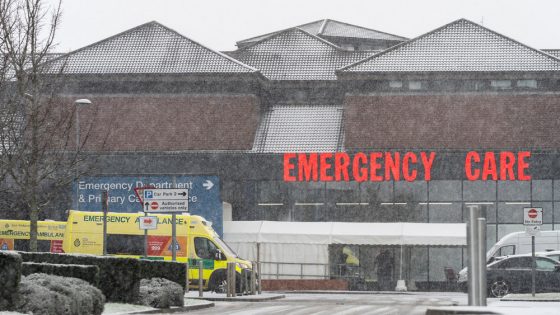Staff burnout major concern for NHS leaders ahead of winter

Most NHS leaders are concerned about burnout and low morale in their workforces as they gear up for what they expect to be an extremely challenging winter ahead, a new survey reveals.
The poll by NHS Providers also showed that the majority of trust chiefs are worried about staffing numbers and skill mix, finances, capacity and the impact of any further industrial action.
“The stark reality is that NHS trusts are facing their toughest test yet”
Julian Hartley
The State of the Provider Sector survey takes place annually and gathers the views of leaders of hospital, mental health, community and ambulance services across England.
The 2023 results suggest that NHS trusts are anticipating one of the toughest winters on record.
Eight in 10 leaders (80%) said they thought this coming winter (2023-24) would be tougher than last year’s winter (2022-23), which 66% of respondents said was the most challenging they had seen.
In addition, 95% of trust leaders who responded to the survey said they were extremely (72%) or moderately (23%) concerned about the impact of winter pressures on their trust and local area.
Lack of funding, fears about further industrial action, high bed occupancy and the circulation of respiratory illnesses such as Covid-19 were all factors cited by leaders as underlying their concerns about winter.
One leader from an acute trust in the South East said: “The financial pressures mean that we are not investing in additional capacity to support winter pressures which is very concerning given the flu/Covid pressures we are likely to be facing.”
Workforce issues were also compounding leaders’ worries about how their services will cope during the upcoming winter season.
More than eight in 10 trust leaders (84%) were concerned about the current level of burnout across their workforce. A similar percentage (83%) were concerned about morale.
Many respondents also lacked confidence in their services having enough staff with the right skills.
In total, six in 10 trust leaders (60%) were worried about whether their trust had the right numbers, quality and mix of staff to deliver high quality healthcare.
The report added: “To manage the risks around not having enough staff, respondents mentioned investing more in recruitment including using overseas recruitment, incentivised pay and conditions and investing in bank and agency staff.
“Respondents also mentioned having incentives to retain staff such as improving staff wellbeing, putting more focus into staff culture and staying true to trust values.”
In terms of capacity, more than three quarters (78%) feared their service may be unable to meet demand over the next 12 months – a higher proportion than before the pandemic in 2019 (61%).
The survey results also showed anxieties about quality of care potentially declining.
More than two fifths of trust leaders (41%) rated the current quality of healthcare provided by their local area as very high or high. However, looking ahead to two years’ time, just 30% thought their service quality would be very high or high.
Money worries were also high among the respondents, with 76% saying they were set to be in a worse financial position than last year.
Meanwhile, nine in 10 (89%) were very worried or worried about whether sufficient national investment was being made in social care.
The survey also questioned leaders on their thoughts on industrial action among their workforces.
Every leader who responded to the poll said continued industrial action over 2023-24 would compromise the NHS’s ability to deliver “national recovery targets” for election and urgent and emergency care. Meanwhile, 99% said the same about the ability of the NHS to address care backlogs.
On a more positive note, most respondents agreed that their trusts were still prioritising efforts around quality improvement, tackling health inequalities and discrimination, and digital innovation.
However, Sir Julian Hartley, chief executive of NHS Providers, said the results overall painted a “very concerning picture about the challenges the health and care sector faces”.
“Patient care and safety are front and centre in everything that trusts do. But the stark reality is that NHS trusts are facing their toughest test yet,” he warned.






